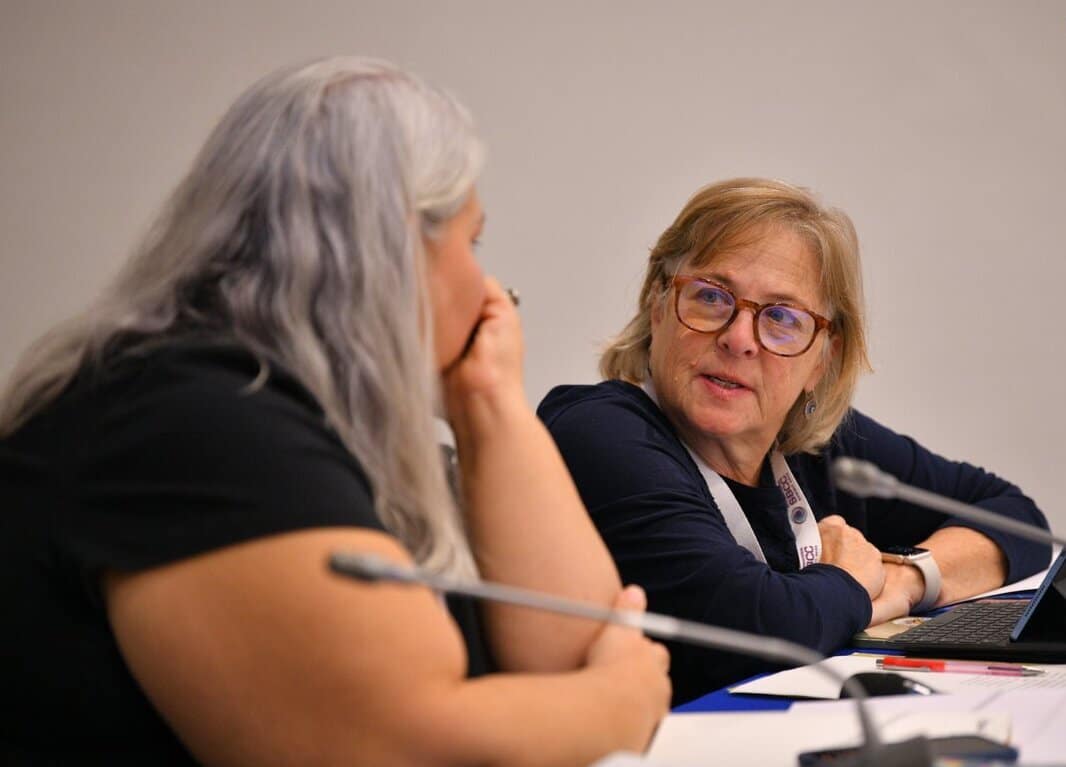After 38 years at the Johns Hopkins Center for Communication Programs in jobs ranging from a program officer for Latin America to deputy director of the center and many of its projects around the world, Alice Payne Merritt, MPH, has announced she will be retiring in June.
Merritt also served as CCP’s technical director. She was involved in some of the center’s earliest HIV work in the 1980s through the Zika crisis of the 2010s and the recent COVID pandemic, for which she led a team that ultimately became a $78 million activity in 26 countries. She has worked across the world, from her time as a Peace Corps volunteer in Ecuador in the early 1980s to her CCP work in Latin America, Africa and Asia, most recently in Indonesia, where a CCP-led effort has significantly improved the government’s family planning system.
“CCP delivers again and again and again,” she says. “We’re very responsive, it’s our nature and we have always seen our work as responding to needs of the people we are reaching. CCP has changed lives around the world, and I am so proud to have been part of that for so long.”
CCP wasn’t even a center when Merritt arrived in late 1984 (today, it is the largest at the Johns Hopkins Bloomberg School of Public Health). It was a small group led by Dr. Phyllis Piotrow, who brought the influential family planning journal Population Reports she started with her from George Washington University in the late 1970s. CCP officially became a center in 1988. Merritt is the longest-serving staffer at the center.
Merritt says her job has always remained interesting because she has regularly been able to turn her attention to new challenges in new parts of the world. She has been consistently energized by learning about different cultures, seeing the shared humanity she found everywhere she went while still recognizing that “everything is local.”
From the beginning, she says, there was so much demand for CCP’s unique expertise in social and behavior change communication and its people-centered approach.
“We were super flexible and sort of entrepreneurial figuring out how to move forward on the go,” she says. “We approached things with more of a marketing model than a traditional clinical model, focused on asking women what they wanted and responding to their needs. And believe it or not, no one had ever done that in a systematic way in international development, or international family planning. And so suddenly, light bulbs went off, and people were like, ‘Wow, that’s a good idea.’”
What really put CCP on the map, she says, were the music videos, the first that were ever used in international development. MTV was sweeping the culture in the 1980s and CCP engaged pop artists, including Menudo in Mexico, future Tony winner Lea Salonga in the Philippines and King Sunny Ade and Oyneka in Nigeria to bring family planning messages to the mainstream, to inspire behavior change on a large scale. She was involved in the provocative “dancing hearts” campaign in Brazil, which was head turning and successful in terms of increasing demand among men for vasectomy.
Merritt has been instrumental in CCP’s advocacy work, a mentor to generations of people at CCP and crucial to the success of CCP’s sister organizations, independent groups that have become their own centers in many of the countries where CCP works. In Indonesia, for example, she was key in the development of advocacy programs that resulted in large increases of local government budgeting for family planning activities that ensured more and improved services for women.
“You’ve been such a pillar for CCP that it’s difficult to imagine CCP without you,” CCP senior researcher Nandita Kapadia-Kundu told Merritt at a recent event celebrating her contributions to the center. Kapadia-Kundu was also one of CCP’s first employees, an intern for Piotrow.
Merritt is a 1980 graduate of Hamilton College and earned her master’s in public health from Columbia University in New York in 1985. She and her husband have raised two grown children in Towson, Md.
“Alice’s hands have been crucial in shaping who we are as a center,” says William Glass, CCP’s other deputy director. “Not only was she there at the founding, but as each new public health crisis appeared, we’ve always turned to her, confident that she would see our way through it with her usual grace, commitment and drive for excellence. Alice has been a mentor to me and so many others at our center and beyond. In fact, a hallmark of her tenure at the center has been her focus on developing the next generation of leaders in our field. That commitment will bear fruit for the organization for years to come.”
Her legacy, she says, is CCP’s legacy. “CCP’s legacy has been social behavior change, pushing those frontiers and expanding SBC across the health and development portfolio,” she says. “And I know that the dedicated people we have at CCP will continue on with that legacy.”





